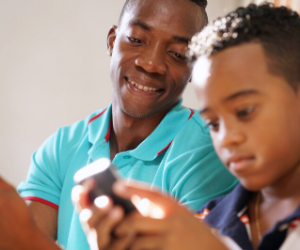NAGC works to support those who enhance the growth and development of gifted and talented children through education, advocacy, community building, and research
Mark Hess
 At age two, my daughter once smashed a water glass on a restaurant table. She was delighted by it (It’s a pretty cool sight if you think about it.), but I couldn’t slink out of there fast enough. Recently, I watched a different scenario unfold as a mother held her smartphone in front of her toddler so he could watch a video while they waited for their food. There was no crying, no fussing or whining, no tossing or breaking things. I had two immediate reactions to the smartphone child-rearing going on at the next table: 1.) Wow, how times have changed! We used paper placemats and the ever-ready crayons restaurants kept at hand, and 2.) I probably would be doing the same thing right now if I were a young parent. Look at how that kid is not causing any trouble!
At age two, my daughter once smashed a water glass on a restaurant table. She was delighted by it (It’s a pretty cool sight if you think about it.), but I couldn’t slink out of there fast enough. Recently, I watched a different scenario unfold as a mother held her smartphone in front of her toddler so he could watch a video while they waited for their food. There was no crying, no fussing or whining, no tossing or breaking things. I had two immediate reactions to the smartphone child-rearing going on at the next table: 1.) Wow, how times have changed! We used paper placemats and the ever-ready crayons restaurants kept at hand, and 2.) I probably would be doing the same thing right now if I were a young parent. Look at how that kid is not causing any trouble!
Not long ago, The Independent and many other news sources jumped to attention at a quote by a British expert on addiction, “I always say to people, when you’re giving your kid a tablet or phone, you’re really giving them a bottle of wine or a gram of coke.” The quote raised the protective shields of millions of parents of Generation Z kids—parents whose impulse to protect their children from all things both physical and emotional may be at an all-time high. In Jean Twenge’s iGen, she correlates several disturbing data trends to the introduction of the smartphone into common culture—trends including increased anxiety, rising suicide rates, loneliness, life satisfaction, and depression. An interview with Twenge on CBS This Morning in which she warned against the addiction to social media raised even more protective shields. Some time passed before the detractors emerged—specifically surrounding the social research pitfall of assuming correlation to be equal to causation. Yes, there are several disturbing trends which correlate to the introduction of the smartphone, but does that mean smartphone use and social media have caused these trends? In short, Lydia Denworth reports for Scientific American, the answer is no. Researchers Przbylski and Orben from Oxford University, amongst others, found that the variance in well-being—both positive and negative—explained by social media was very small . . . equivalent to eating potatoes and not as negative as wearing glasses.
Aside from not boding well for the stereotypical glasses-wearing nerd, the effects of social media on GenZ gifted kids are at once concerning and promising. Where does the truth lie?
 Already challenged in the friendship area because of asynchronous development and difficulties finding others who share the same interests, gifted learners may face greater challenges growing up as a part of Generation Z. Do our gifted kids envy the well-placed selfie and flood of likes from followers, or do they see through the hollow chase? Do Instagram photos full of stylized fun and frivolity cement the “differentness” of our gifted kid’s experience? Do our existential thinkers see something deeper and more meaningful than profiles? Nonetheless, there is a brighter, less shallow side to social media. Online interest groups and gaming cross physical distances to bring together like-minded young adults. A decade ago, no teen talked about friends four states away whom they “met” through online gaming. Only a click away sit the Society for Creative Anachronism and gifted online communities. Groups like Weird Secondhand Finds that Just Need to be Shared connect quirky people of all ages in a safe and moderated forum on Facebook. None of these opportunities to form friendships and to connect, however, are the in person and face-to-face friendships. Jean Twenge reports that time spent in person with friends has been cut in half over the past 15 years and GenZers are the least likely to engage in any face-to-face social interaction compared to any other demographic. Is this the perfect formula to make the quirky even more quirky and the outsiders further out on the edge? Stanford professor Jeff Hancock’s meta-analysis, on the other hand, found that social media use was more strongly associated with relationship benefits than with depression and anxiety. Potatoes or cocaine?
Already challenged in the friendship area because of asynchronous development and difficulties finding others who share the same interests, gifted learners may face greater challenges growing up as a part of Generation Z. Do our gifted kids envy the well-placed selfie and flood of likes from followers, or do they see through the hollow chase? Do Instagram photos full of stylized fun and frivolity cement the “differentness” of our gifted kid’s experience? Do our existential thinkers see something deeper and more meaningful than profiles? Nonetheless, there is a brighter, less shallow side to social media. Online interest groups and gaming cross physical distances to bring together like-minded young adults. A decade ago, no teen talked about friends four states away whom they “met” through online gaming. Only a click away sit the Society for Creative Anachronism and gifted online communities. Groups like Weird Secondhand Finds that Just Need to be Shared connect quirky people of all ages in a safe and moderated forum on Facebook. None of these opportunities to form friendships and to connect, however, are the in person and face-to-face friendships. Jean Twenge reports that time spent in person with friends has been cut in half over the past 15 years and GenZers are the least likely to engage in any face-to-face social interaction compared to any other demographic. Is this the perfect formula to make the quirky even more quirky and the outsiders further out on the edge? Stanford professor Jeff Hancock’s meta-analysis, on the other hand, found that social media use was more strongly associated with relationship benefits than with depression and anxiety. Potatoes or cocaine?
The tween years are particularly difficult for gifted girls whose levels of confidence fall 30% between the ages of eight and fourteen. The pressure to fit in, to deny one’s intellect, and to settle into society’s expectations for females weigh heavily. Enter the cyberbully. Twenge notes that girls are more than twice as likely to be cyberbullied and “carry out the verbal aggression they favor, ostracizing and excluding other girls.” This bully comes at you not just on the playground, in the cafeteria, or in the hallways, but in your hand on your smartphone day and night, seven days a week. Why not simply put down that smartphone, close the app? Just like kids can’t simply skip recess to avoid a bully (though, all too often, some of my students would do anything to stay in from recess and read a book), it’s not so easy to put down the smartphone when the cyberworld is so entwined with one’s own daily experience.
Katty Kay and Claire Shipman, the authors of The Confidence Code for Girls, suggest that social media can actually play a positive role in the lives of girls. It’s true that body image can suffer for girls who live in the online world full of staged modelling shoots and duck-lipped selfies. Kay and Shipman, however, cite recent research that shows girls who follow high-achieving women with similar interests on social media enjoy an expanded world view. They recommend that parents urge daughters to follow four prominent women working in areas of interest. Purposeful and interactive media use, in this case, serves as a tailwind for young gifted girls.
25 years ago I met the “what if?! boy.” As I facilitated gifted students’ work on projects, the “what if?! boy” sometimes followed me around the classroom as he shared idea after idea after idea. “What if Da Vinci had been able to build a helicopter? What if a training program could develop a human’s arm and shoulder muscles to make it possible to flap giant wings? What if the knights of the middle ages had been able to make armor from plastics?” In these moments, I learned it was hopeless to stop him. Ignoring him made no difference. He followed me all the way to the teacher’s lounge after class—still talking! Like so many gifted kids, his desire for knowledge seemed to have no end.
GenZers have at their disposal an amazing toolkit of online possibilities. For some kids (included twice-exceptional) whose nonverbal ability far outweighs their verbal ability, reading deficits no longer hold them back in this generation which relies on communicating with visuals and where podcasts on almost any topic are free. 60% of GenZ prefers to learn from YouTube, and they watch two times as many videos on smartphones than any other demographic. “Why don’t you just Google it?” would have drawn questioning eyebrows during the adolescence of the previous generation. Today it speaks to the possibility of answering so many of the questions of what if?! boys and girls everywhere.
Despite criticism, Jean Twenge’s iGen provides a wealth of data, and no matter if you believe smartphones have ruined a generation or have a potato-sized effect on well-being, she offers sage advice: Put the phone down. Go outside. Do something with another person. I would add, however, that sometimes it’s healthy to pick up that smartphone, too. Have smartphones ruined a generation? The answer about whether social media is ruining the lives of a generation of gifted children, it seems, lies somewhere between OMG and a smiley-faced emoticon.
About the Author: Mark Hess has spent 31 years teaching gifted learners. He is the Gifted Programs Specialist in Colorado Springs District 11, the Pikes Peak Association for Gifted Students president, and state board member for the Colorado Association for Gifted and Talented. As Portable Gifted and Talented, he trains teachers and has published 225 units specifically designed for gifted learners. Mark has three social-emotional lesson collections due to be published by Prufrock Press in the spring of 2021.
The views expressed here are not necessarily those of NAGC
8 Reasons Gifted People Find it Hard to be Happy. Learning Mind website (https://www.learning-mind.com/gifted-people-happy/ ) accessed 12/10/19.
CBS This Morning, Interview with Jean Twenge (https://www.youtube.com/watch?v=E8oBrmlIZe8 ) accessed online 10/23/19.
Denworth, Lydia. Social Media Has Not Destroyed a Generation. Scientific American website (https://www.scientificamerican.com/article/social-notworking-is-generation-smartphone-really-more-prone-to-unhappiness/ ) accessed 10/25/19.
Girls’ Confidence Plummets Starting at Age Eight: Here’s How to Keep Her Confidence Strong. A Mighty Girl Website (https://www.amightygirl.com/blog?p=27408) accessed 12/22/19.
Giving your child a smartphone is like giving them a gram of cocaine, says top addiction expert. The Independent Website (https://www.independent.co.uk/news/education/education-news/child-smart-phones-cocaine-addiction-expert-mandy-saligari-harley-street-charter-clinic-technology-a7777941.html ) accessed 12/17/19.
Twenge, Jean M., Ph.D. iGen: Why Today’s Super-Connected Kids are Growing Up Less Rebellious, More Tolerant, Less Happy—and Completely Unprepared for Adulthood. Atria: 2017.
Webb, James T., Ph.D., et al. A Parent’s Guide to Gifted Children. Great Potential Press: 2007.